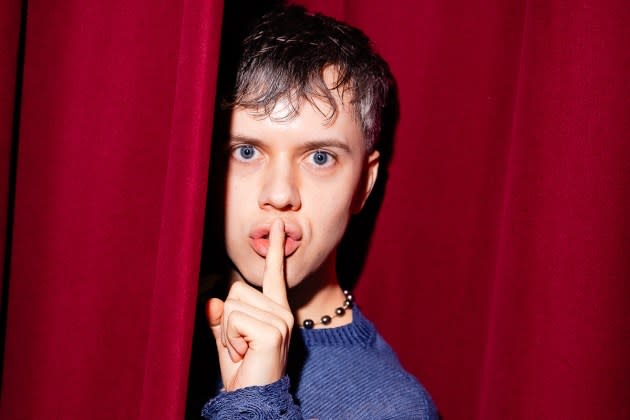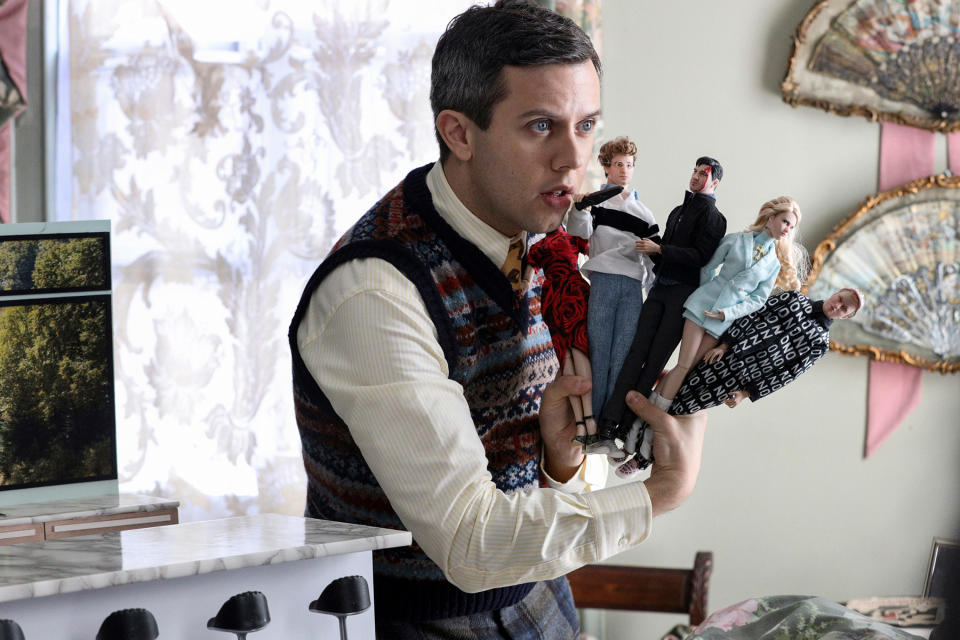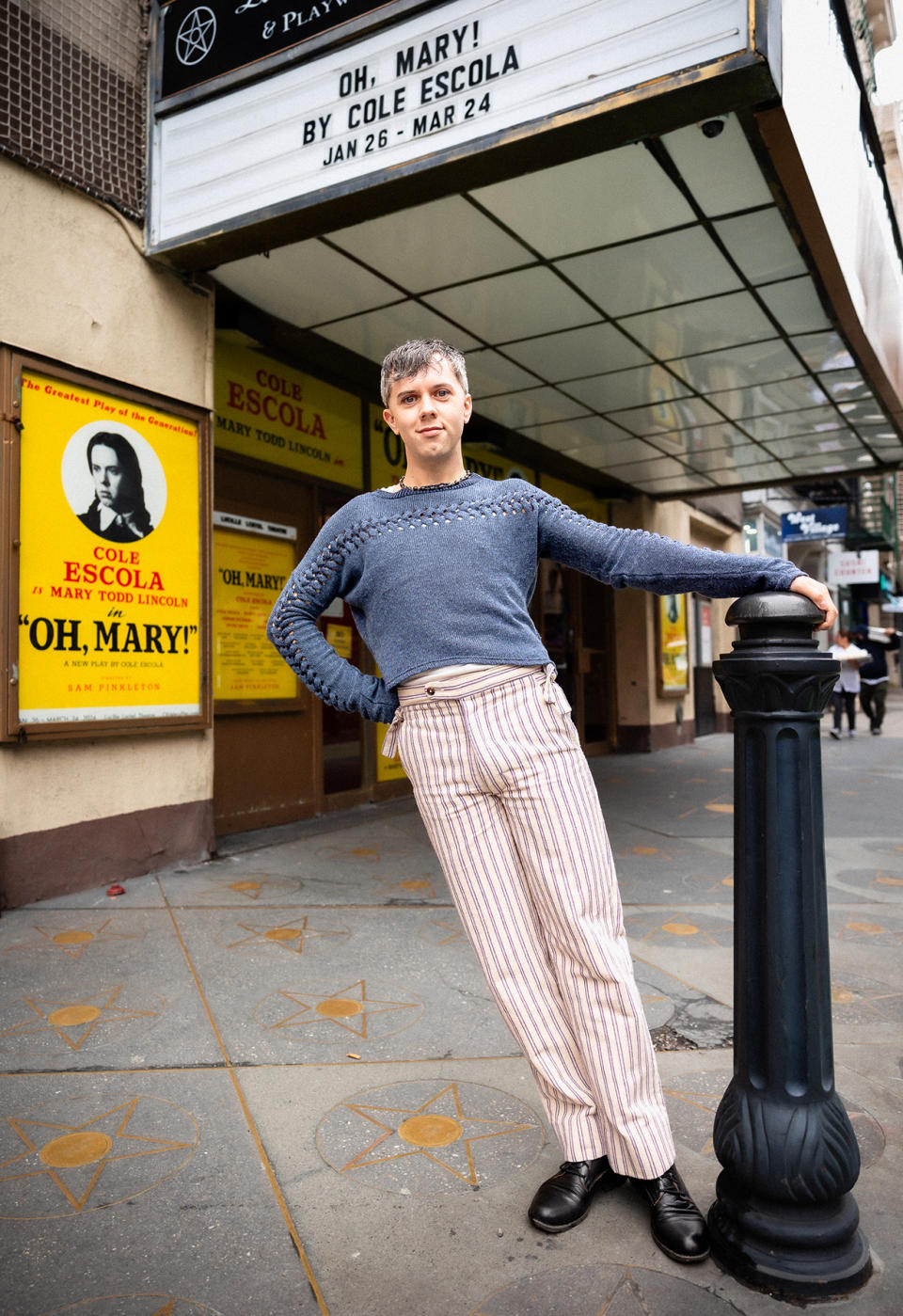Cole Escola Is Revolutionizing Queer Comedy
- Oops!Something went wrong.Please try again later.
- Oops!Something went wrong.Please try again later.
- Oops!Something went wrong.Please try again later.

It’s a chilly Sunday night in Manhattan’s West Village and somehow the hottest ticket in town involves a sexually repressed Abraham Lincoln, hoop skirts, and comedian Cole Escola in a wildly convincing nineteenth-century wig.
There’s a line down the block outside the Lucille Lortel Theatre, and inside, the energy builds as patrons make their way through packed halls and walkways to their seats. Queer isn’t just a vibe here, it’s built into the streets — just three blocks from the Stonewall Inn — etched into the gold stars on the sidewalk, even floating in the air in between the pride flags in almost every single storefront. But people aren’t here to revel in the Lortel’s historic imagery. They’re here to see Escola take the stage in their Off-Broadway debut, a dark and intensely funny comedy about the life of former First Lady Mary Todd Lincoln. And Escola? Well, they’re freaking the fuck out.
More from Rolling Stone
“I need to challenge myself as a performer and as a writer. And so, the thought of this play is the most terrifying thing that I can think of doing,” Escola tells Rolling Stone. “I’m terrified — of doing a bad job, of disappointing audiences. Of being washed up at 37.”
Forget washed-up — Escola might not yet be a widely recognizable name, but the 37-year-old is on track to become one of the most original and influential voices in the alternative comedy scene. (Escola is nonbinary and uses they/them pronouns.) On the street, Escola looks unassuming, their thin frame made most striking by their wide and expressive eyes. But in their 10-plus years in the industry, Escola has gone from small bit roles to an integral part of major cult-classic comedies. They’re an actor, a writer, a producer, a playwright — and Oh, Mary! is just the next step in their comedic climb.
There’s an alternate world where audiences never got a chance to revel in Escola’s unique blend of camp and comedy. They moved out at 16 to follow a high school boyfriend to New York City, where they applied to — and were rejected from — what felt like “every school” in the city before attending Marymount Manhattan College, a small liberal arts school on the Upper East Side. They lasted exactly one year before dropping out due to the financial burden. Only when school was no longer an option did Escola consider acting and comedy as a viable career choice. While making YouTube videos and performing at small venues with friend and collaborator Jeffrey Self, the pair were approached in 2010 with a vlogging opportunity with LogoTV.
“I didn’t even want to perform before,” Escola says. “Theater programs in colleges seemed designed to make gay people act straight. But once those [videos with Self] started getting views on YouTube and we got Logo, I was like, ‘Oh, maybe I can do this.”
The pair made oddball sketches filmed on their MacBook, featuring them in absurd scenarios like dueling students at an all-girls Catholic school or desperate friends channeling Erin Brockovich and cosplaying in court. The clips went over well enough that they were rewarded with an on-air sketch show, Jeffery and Cole Casserole, which aired on LogoTV for two seasons. The pay wasn’t much, Escola says, but it made them feel like “the queen of New York.” Their repertoire soon included a recurring role on the Hulu comedy Difficult People, playing struggling gay actor Matthew alongside comedians Billy Eichner and Julie Klausner, and a part on Amazon’s Mozart In The Jungle as a sardonic roommate named Shawn.
But on the side, Escola also began to develop their signature comedic style. Their visage, which is dominated by an acerbic and often crooked grin, thrives on physicality. For Escola, all it takes is a wig and a walk to utterly transform — not just into a character, but seemingly into a person with an entirely different backstory. Comedian and talkshow host Ziwe first met Escola while the pair did alt-comedy shows at New York venues like Union Hall and the Bell House. When she was given her own variety show ZIWE, Escola joined as a writer.
“What stuck out most to me was Cole’s attention to detail and steadfast vision. Every bit they did, every piece they wrote, every character they embodied was so funny and so genius,” Ziwe tells Rolling Stone. “I loved how original and stylistic their comedic style was. Although I met Cole years ago, clearly not much has changed.”
For veteran comic Amy Sedaris, who first worked with Escola on Difficult People before asking them to join her as an actor and writer on At Home With Amy Sedaris, it was no surprise when they moved from the writers’ room to more and more distinctive roles on camera. She tells Rolling Stone that Escola’s type of comedy is so silly and entertaining that audiences get jealous because they wish they could jump on stage and play alongside them. “Cole has an old soul with a young spirit,” Sedaris says. “They’re the kind of person that throws a hole on the wall and then takes you through it with them. And they don’t just toss a wig on their head. They respect the wig.’

But Escola’s stellar, breakthrough performance came on the fourth season of HBO Max’s Search Party in 2021, playing Chip Wreck, a neurotic, obsessed fan who stalks and kidnaps Alia Shakwat’s Dory Sief. While originally imagined as a bit part, showrunners Charles Rogers and Sarah-Violet Bliss told Vanity Fair that it was beefed up to showcase Escola’s ability to mirror the idiosyncrasies of older women. It’s a role that could have been a one-off, but Escola turned it into a quintessential performance, one made even more fascinating by the fact that they think they could’ve done a better job.
“I only watched that season once,” Escola says. “And I felt like I watched myself be constrained by my own self-consciousness. When I’m in front of a camera, I freeze up a little bit, because this is forever. I just like, lose it and lose the magic. There’s not a sense of having the audience in your hands. But on stage there is.”
EVEN WHEN ESCOLA ISN’T on stage, the preparation for Oh, Mary! is still with them. Walking around their Brooklyn apartment, notes for the show lay in the shadow of a poster of Bette Davis, powdered, wigged, and in costume from The Private Lives of Elizabeth and Essex, her 1939 historical romance with Errol Flynn. The entire home is reminiscent of a craft fair come to life, down to the crocheted granny square blanket near the couch, and small porcelain cat figurines in the window. On the walls are several pastel Victorian-themed murals painted carefully by friend and stage collaborator Steven Hamill, depicting the silhouettes of gowned women sitting at pianofortes, top hats, and cravats floating above tea sets and horse-drawn carriages.

Escola thinks the aesthetic, which they refer to as part “cartoon,” part “dollhouse,” is a bit too impractical to stay forever, but notes that much of the enthusiasm for decorating came from the rush of getting their own apartment in 2017. “This is [the] first place that I’ve ever had on my own,” they say. “So I went full out, painting, getting all the furniture, I did it all in one go immediately. And now it’s a little intense.”
Emotions aren’t just a guiding force in the comedian’s life — they are an ever-present factor in their art-making process, playing out their inner feelings onstage. “I have this character called the Goblin Commuter of Hoboken,” Escola says. “It was just a funny idea to me that this goblin was just a typical Wall Street, Sweetgreen nine-to-fiver, and then afterward, I realized, ‘Oh, I think that’s me playing out how I see myself in romantic situations.’ As this goblin trying to pass themselves off as just a regular, flirty kind of person.”
That anxiety serves a two-fold purpose: In Escola’s life, it can mean agonizing over what people might think about personal decisions. The comedian says that before coming out as nonbinary they identified with they/them pronouns and never felt constrained by a single gender, but struggled with what using the label might mean for creating tension in personal interactions.
“I realized I was not using the label because I was like, ‘That’s annoying. People will be annoyed and uncomfortable around me. They might slip up and say he/him and then feel self-conscious and I don’t want them to feel that way,’” Escola says. “I guess I have to be part of the growing pains phase of they/them pronouns.”
But for Escola, accepting their gender journey also meant discovering more freedom in their performances — especially in interrogating why they identify so strongly with middle-aged women. The comedian grew up in Clatskanie, Oregon, a “rural mill town,” with their mother and younger brother. “I was like, there’s gotta be more than this,” Escola says. But some of their most precious memories are the time they spent with their grandmother and her best friends — a group of women they say inform some of the funniest roles.

“It always bothered me when people would think the joke was that I was playing a woman. I never saw myself as a boy making fun of women,” Escola says. “They were my friends growing up. They were who I wanted to be. They were the ones that accepted me. I would fake sick every Monday so that I could go have lunch with my grandma and her friends. I just wanted to be a middle-class woman in her early sixties running errands. This is who is fascinating to me. I can’t think of an interesting man.”
Escola’s comedy thrives on taking the familiar and undermining it with a quick force. They exude a comedic style from a long-forgotten era, a sitcom persona with a starlet’s tragic backstory. Think Lucille Ball’s ability to make a studio audience get close to splitting their pants with just a look, or Fanny Brice’s use of vaudeville as both a bit and demonstration of clear musical prowess. While they’ve been plenty successful in making solo shows, Oh, Mary! is about taking that aesthetic and building an entire play around it — one where characters people know get to shock and delight.
Here is what history books tell us: Abraham and Mary were married and served as President and First Lady. Here with what Escola shows audiences: In the titular role of Mary Todd, Escola is not a stoic head of state but a drunken, shrieking woman, who just wants to fuck and also be a cabaret star. She is quick to torment her staff, hates her children, desperate for a drink, and constantly irritates her husband — who is fresh off a war and praying to God for help while his wife tries, and fails, to learn Romeo and Juliet.
“One of my favorite things in writing is tent poles,” Escola says. “It’s why Christmas comes up so much in my work, because everybody knows what Christmas is and all the expectations that are attached, but then I can fill in a bunch of the blanks. It’s basically Mad Libs. So I felt that way with Mary Todd Lincoln. She’s not a big personality. It’s not like she’s some diva who we hear all these stories about. So it’s funny to me to be like, ‘Oh, what if she was an idiot?’ Like, ‘Abraham Lincoln’s wife was blank,’ and I get to fill in the space.”
IT’S A WEEK INTO PREVIEWS for Oh, Mary! and Escola is exhausted, but pushing through it. While sitting in an empty row of seats at the Lucille, tech, and crew buzz around them while they speak softly, pausing here and there while a producer checks walkie-talkies and speakers in the back of the house. They’re on a modified vocal rest — and a bit ashamed of even saying the phrase — saving their breath for the vocal calisthenics they still have to perform for eight shows a week. But in the midst of the bustle, perspective is still something at the forefront of their mind.

“The great thing about theater is the next night, you get to do it again. I’m trying to let go of some of the perfectionism, to leave room for, like, being human and having fun. But I want this to be the best it can possibly be,” they say. “Just the names out front, all those queer playwright-actress crossovers. I feel like this will be a life peak for me. I definitely will look back on this as one of the most special times in my life.”
“Cole the writer,” is proud of what they’ve accomplished. As “Cole the Actor,” they’re excited to develop a groove and a singular focus on connecting with the audiences who file into the theater between now and the final show on March 24. “I feel like a kid making a play for their family or their friends,” they say. “But I don’t know, Cole the Star hasn’t been born yet. Check in in eight weeks, and I’ll be firing people and throwing tantrums and calling out of shows.”
Escola’s comedy isn’t about mockery. They operate from a deep well of understanding, which is what takes their performances from imitation to airtight. As Mary, they command the room, control the crowd, and, on more than one occasion, threaten to make their own co-stars break into laughter. For Cole, that Sunday night performance is their worst nightmare come to life. There are technical difficulties, including their hoop skirt snapping between two scenes and a rather fast costume change. But of course, the crowd was completely unaware. When Escola took their curtain call, the screams and cheers roared from the standing ovation, only ending when Escola quickly bowed and then ducked straight back behind the curtain. They’re at a point in their life where they’re willing to accept the praise. The next step is getting them to trust it.
“They’re liars,” Escola says. “Someone is gonna throw things. There’s still plenty of time.”
Best of Rolling Stone

